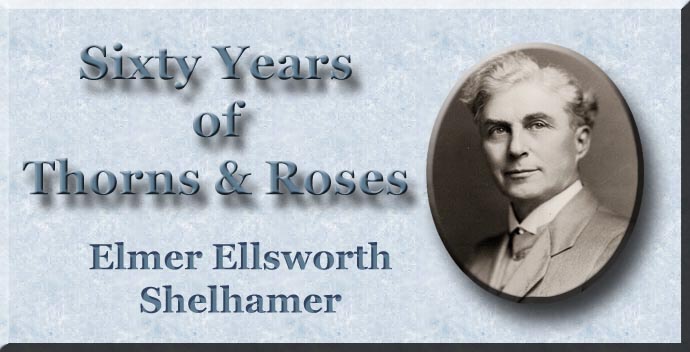
60 Years of Thorns & Roses
By Elmer Ellsworth Shelhamer
Part II
Chapter 47
DOING RIGHT THINGS IN A WRONG WAY
Finney says: "Men are bound to reprove their neighbor for sin. Love to God plainly requires it, and love to your neighbor demands it." There are many commendable things that can be performed in a wrong spirit; for instance, there is such a thing as correcting a child in the wrong way; giving to God's cause from a wrong motive; testifying in such a manner as to draw attention to self; and preaching against certain evils in such a way as to attack the prejudices of the people, instead of appealing to their reason or conscience. Doing these things at the wrong time or in the wrong way often does more harm than good. But we desire more particularly to notice the art of successfully reproving our neighbor. It required a long time for the writer to learn this. Perhaps I have not fully learned the lesson yet, but am pressing on to know. Not until I had passed through many a misunderstanding and misrepresentation myself, did I fully learn that there are two sides to every story; that when anyone was charged as being guilty, I should not allow myself to be easily biased or influenced against him and, accordingly, pass sentence before hearing the other side. Doubtless he had a reason for taking the course he took, and as a Christian I ought to go as far as an atheistic judge, who is supposed to be on the prisoner's side until he is proved guilty. Oh, that many who are looked upon as models of piety could take a few lessons along here! It is so easy to fall into the habit of discussing the strong and weak points of absent brethren. This leads either to evil speaking or to something about as hurtful -- feeding pride and bolstering up self in view of the fact that you are not so bad as the one discussed. I can feel sad even now as I look back, and see where, upon false or inferential evidence, furnished me by an influential on, I formed an opinion, or went further and censured another, when later I found him to have been greatly misrepresented. Is it not as wrong to rob another of his influence for good as to rob him of any other thing? If he be a minister this is his capital, this is his bank account, and it is no greater crime to steal his horse and buggy than to kill his influence for good. "But," says one, "his influence is not good." Then you should follow the Scriptural plan (Matt. 18:15-17), and go to him like a man and "tell him his fault between thee and him alone." It is cowardly and mean to wait until you have a crowd on your side, or wait and, after you get away, write a letter. But even here there is a possibility of making a great mistake; not only must the proper method be employed, but the proper time as well. It is not best to deal with another in a heated or severe manner. It does not produce good or lasting results; besides, it lessens one's influence. The greater the offense the more need there is of calmness and melting. This cannot be had without much prayer and deliberation beforehand. Another secret is to study the disposition and watch for the opportune moment when the reproof will be accepted. Oh, the need of divine wisdom in dealing with immortal souls! Lord, give it to us all! |
|
 |
 |
|
|
|
-
Site Navigation
 Home
Home What's New
What's New Bible
Bible Photos
Photos Hiking
Hiking E-Books
E-Books Genealogy
Genealogy Profile
Free Plug-ins You May Need
Profile
Free Plug-ins You May Need
 Get Java
Get Java.png) Get Flash
Get Flash Get 7-Zip
Get 7-Zip Get Acrobat Reader
Get Acrobat Reader Get TheWORD
Get TheWORD